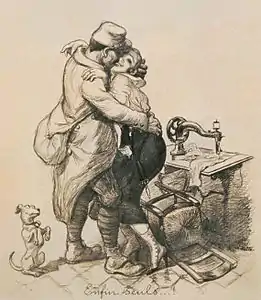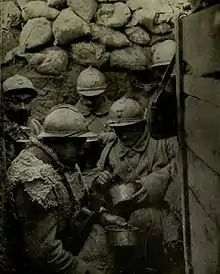Poilu
Poilu (/ˈpwɑːluː/; French: [pwaly])[1] is an informal term for a French World War I infantryman, meaning, literally, hairy one. It is still widely used as a term of endearment for the French infantry of World War I. The word carries the sense of the infantryman's typically rustic, agricultural background. Beards and bushy moustaches were often worn. The poilu was particularly known for his love of pinard, his ration of cheap wine.[2][3]


The image of the dogged, bearded French soldier was widely used in propaganda and war memorials.[4] The stereotype of the Poilu was of bravery and endurance, but not always of unquestioning obedience. At the disastrous Chemin des Dames offensive of 1917 under General Robert Nivelle, they were said to have gone into no man's land making baa'ing noises—a collective bit of gallows humour signalling the idea that they were being sent as lambs to the slaughter. Outstanding for its mixture of horror and heroism, this spectacle proved a sobering one. As the news of it spread, the French high command soon found itself coping with a widespread mutiny. A minor revolution was averted only with the promise of an end to the costly offensive.
The last surviving poilu from World War I was Pierre Picault. However, French authorities recognised Lazare Ponticelli—who had served in the French Foreign Legion as an Italian citizen—as the last poilu, as he was the last veteran whose service met the strict official criteria.[5] Lazare Ponticelli died in Le Kremlin-Bicêtre on 12 March 2008, aged 110.[6]
See also
- A Very Long Engagement, a French film in which poilus are featured
- Digger, referring to Australian and New Zealand soldiers
- Doughboy, referring to American soldiers
- Mehmetçik, referring to Ottoman soldiers
- Tommy, referring to British soldiers
References
- Dictionnaire canadien / The Canadian Dictionary, McClelland & Stewart, Toronto, Ontario, 1962.
- Pierre Nora; David P. Jordan (15 August 2009). Rethinking France: Les Lieux de Memoire, Volume 3: Legacies. University of Chicago Press. p. 217. ISBN 978-0-226-59134-6.
- Patricia E. Prestwich (1988). Drink and the politics of social reform: antialcoholism in France since 1870. Society for the Promotion of Science and Scholarship. p. 172.
- La représentation du poilu dans les cartes postales (in French)
- "France, derniers poilus de la Guerre 14-18" (in French)
- "Last French World War I Veteran Dies at 110", (13 March 2008) The New York Sun, Retrieved on 2008-03-19.
Further reading
- Barthas, Louis (2015) [1st pub. Maspero:1978]. Poilu: The World War I Notebooks of Corporal Louis Barthas, Barrelmaker, 1914–1918 [Les Carnets de guerre de Louis Barthas, tonnelier: 1914–1918] (in French). Translated by Strauss, Edward M. Yale University Press. p. 426. ISBN 978-0-300-21248-8.